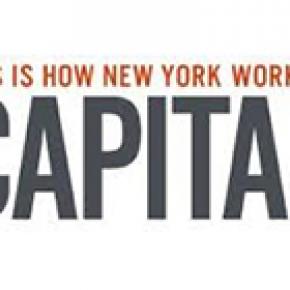Dozen protesters arrested in Manhattan during May Day rallies

Dozen protesters arrested in Manhattan during May Day rallies
Exuberant rallies, inspirational speeches and more than two dozen arrests for the cause of immigrant workers marked May...
Exuberant rallies, inspirational speeches and more than two dozen arrests for the cause of immigrant workers marked May Day celebrations around the city on Monday.
A dozen protesters were arrested outside JPMorgan Chase’s Park Ave. headquarters, and demonstrators also gathered in front of a Wells Fargo bank nearby, highlighting the two institutions’ financing of private Immigration and Customs Enforcement detention facilities.
Read full article here.
Fed's Williams vows more transparency after meeting with Fed Up
San Francisco Fed President John Williams has promised more transparency after a rare meeting with a coalition of...
San Francisco Fed President John Williams has promised more transparency after a rare meeting with a coalition of community and labor groups which also urged the U.S. central banker to keep interest rates low.
Williams largely dismissed their call to hold off on interest-rate hikes, repeating his mantra that monetary policy will depend on economic data. But he said the meeting earlier this week pushed him to "think a little more proactively" about how the Fed recruits and promotes top management.
"I want the Fed to be more transparent," Williams said in an interview. "We've learned along the way that this process of selecting presidents and other aspects of the Fed are not that clear to the public. We should make it more open."
While the San Francisco Fed is not searching for a president or first vice-president, "we want to make sure not only are we doing it right, but also in the future maybe to move the ball forward even further," he said.
He noted that the Minneapolis Fed's openness about its ongoing presidential search is one example to learn from.
The Fed's perceived opaqueness has drawn increasing fire in recent months, with Fed Chair Janet Yellen in testimony this week standing her ground against Congressional efforts to subject the Fed to more oversight. Regional Fed banks' executive searches are also under scrutiny for apparent insularity.
Williams said the meeting also reminded him that despite strengthening overall economic growth, there are "a significant number of people who are left behind and struggling."
One example is Ebony Isler, who ran a hairdressing business until recession-hit clients could not afford her services.
Now, as a part-time cashier at the San Francisco Giants' downtown ballpark, she relies on high-interest loans to bridge her paydays.
"I can't find a job that pays me enough to be self-sufficient," Isler said in an interview after she and a dozen other members of the non-profit group Fed Up met with Williams on Monday.
The group, which first grabbed national attention last summer when it crashed the Kansas City Fed's annual central bankers' meeting in Jackson Hole Wyoming, presented Williams a report arguing that as long as inflation and wage growth remains dull, the Fed should keep rates near zero. (/news/mind-gap-how-federal-reserve-can-help-raise-wages-america-s-women-and-men)
Williams regularly meets with bankers and chief executives.
Meeting with activists, he said, "helps you to think concretely about why are people out of the labor force, what are the problems they are facing."
The group has also sat down with Yellen, Kansas City Fed President Esther George and Boston Fed chief Eric Rosengren.
Source: CNBC
Rivera and Camara Push 'Ambitious' Bill for Noncitizen Voting
Capital NY - June 16, 2014, By Nidhi Prakash - With just four remaining days in the state legislative session, sponsors...
Capital NY - June 16, 2014, By Nidhi Prakash - With just four remaining days in the state legislative session, sponsors of a new bill to grant citizenship rights to undocumented immigrants said they hope to begin building momentum for next session.
“First of all, this is obviously not something that is going to pass by the end of this week," said State Senator Gustavo Rivera, at a press conference in Battery Park City. "This was never about this particular legislative session. We’ve been working on it for almost two years, it’s a bold idea and we wanted to make sure it was thought out."
The bill, titled the New York is Home Act, would make it legal for undocumented immigrants in New York State to vote in local and state elections, get professional and drivers' licenses, and make them eligible for state-funded Medicaid and financial aid for higher education.
“What we’re doing today is we’re starting a conversation not only in New York, but hopefully across the country,” said Rivera, who was joined at the press conference by representatives from the Center for Popular Democracy and Make the Road New York.
Senator Rivera said he was choosing this moment to introduce the bill, despite nearing the end of the legislative session, partly because of a lack of movement in Washington on immigration reform. He pointed to the defeat last week of Republican House majority leader Eric Cantor by a Tea Party candidate who criticized Cantor's support for limited immigration reform.
But some progressives have also balked at provisions in the proposed bill. Mayor Bill de Blasio has called for municipal ID cards for undocumented immigrants, but said last year he's "not comfortable" with the idea of noncitizen voting.
“We are certainly asking for everyone in the Senate and the Assembly as well as in other sectors—the mayor and the governor—to support it, and we will have conversations with them going forward," Rivera said. "We are just starting the conversation."
Assembly Member Karim Camara, the bill’s sponsor in the Assembly, said the broad scope of the bill could help other stalled measures, like the Dream Act and a bill to allow undocumented immigrants access to drivers' licenses.
“We’re hoping that by looking at this big picture, and this is probably one of the most ambitious efforts over at least the last decade or two, maybe those smaller pieces now seem like they’re not that big of a deal,” said Camara.
Camara said he hoped the bill would create momentum for other immigration reform initiatives by the start of the next legislative session.
“We didn’t break it into priorities in this bill, but we’re hoping that by looking at this overarching bill it’ll perhaps make those other smaller bills easier—drivers' license, Dream Act, et cetera,” he said.
Camara blamed the balance of power in the Senate for those bills being unsuccessful in the past, and said if that was to change there may be more hope for immigration reform on a state level.
“The Republican-led Senate has been a main challenge," he said. "We would have passed it this year if it was not for that. So of course there is that elephant in the room, that political dynamic that we can’t avoid, and if that’s not the case then we’ll appeal to individuals’ reason."
Source
Victima de abuso sexual se identifica con Blasey Ford
Para la activista Ana María Archila, víctima también de violencia sexual, el caso de Kavanaugh despierta el de muchas...
Para la activista Ana María Archila, víctima también de violencia sexual, el caso de Kavanaugh despierta el de muchas mujeres que han sido objeto de abuso.
Read the full article here.
Investment Banks Doubled Down on Immigration Detention Amidst Family Separation

Investment Banks Doubled Down on Immigration Detention Amidst Family Separation
CoreCivic and Geo Group are highly reliant on loans to function and expand, according to a report from Make The Road,...
CoreCivic and Geo Group are highly reliant on loans to function and expand, according to a report from Make The Road, The Center for Popular Democracy and Enlace, a group that advocates for private prison divestment. In 2017, nine out of ten dollars CoreCivic had on hand were borrowed from banks, while 19 out of 20 dollars Geo Group had on hand were also borrowed according to the report. J.P. Morgan is the largest lender for both companies, holding $167.5 million in debt, which is 62 percent more than the next lender.
Read the full article here.
Why Is My Bank Teller Trying to Sell Me a Credit Card I Don't Want?
Mother Jones - April 9, 2015, by Josh Harkinson - Until recently, your typical banker was someone whose main job was to...
Mother Jones - April 9, 2015, by Josh Harkinson - Until recently, your typical banker was someone whose main job was to accept deposits, cash checks, and dispense basic financial advice. But now that job hardly exists anymore—at least not as we once knew it. Today's front-line bank workers—tellers, loan interviewers, and customer-service reps—earn far too little money to be considered "bankers" in the traditional sense of the word. And though they still collect and dispense money, their main job involves hawking credit cards and loans you probably don't need.
Many rank and file bank workers are seeing lower wages and more pressure to hawk financial products.Rank-and-file bank workers are both causes and symptoms of America's widening economic divide, says Aditi Sen, the author of Big Banks and the Dismantling of the Middle Class, a report released today by the Center for Popular Democracy. Based on union organizer interviews with hundreds of workers in the industry, Sen found that front-line bank workers often face quotas for hawking potentially exploitive financial products, often to low-income customers, even though the workers themselves barely qualify as middle class. "We can definitely see bank workers as part of the same continuum of issues facing all low-wage workers," she says.
Banks are, of course, notorious for squeezing profits from their employees and customers. In 2011, the Federal Reserve Board fined Wells Fargo $85 million for forcing workers to sell expensive subprime mortgages to prime borrowers. And in late 2013, a judge slapped Bank of America with a $1.27 billion penalty for its "Hustle Program," which rewarded employees for producing more loans and eliminating controls on the loans' quality.
Yet, by some accounts, these sorts of practices are getting worse. In a 2013 study by the union-backed Committee for Better Banks, 35 percent of low-level bank workers surveyed reported increased sales pressure since 2008, and nearly 38 percent stated that there was no real avenue in the workplace to oppose such practices. One HSBC bank employee, according to the study, reported that workers who failed to meet their sales goals had the difference taken out of their paychecks.
The increasing sales pressure comes at a time when the fortunes of the banks and their low-level workers have diverged widely. Bank profits and CEO pay have rebounded to near record levels while wages for front-line workers are stuck in the gutter.
And that's not all. Nearly a quarter of bank workers surveyed in 2013 reported that their benefits had been cut since 2008, and 44 percent reported that their medical and life insurance was inadequate. A recent University of California-Berkeley study found that 31 percent of bank tellers' families rely on public assistance at an annual cost of $900 million to taxpayers.
There are several factors in all of these woes. Mergers and consolidation have led some retail banks to shutter branches and lay people off. Many banks have outsourced customer-service jobs to overseas call centers, and the rise of internet and smartphone banking has further slashed demand for flesh-and-blood tellers. In other words, it's basically the same mix of foreign and technological competition that has concentrated wealth and depressed middle-class wages throughout the economy. And it means that banks can get away with paying people less, and demanding more in return.
But now the Committee for Better Banks is trying to cultivate common cause between low-level bank workers and the customers they're forced to target. The interviews featured in the new report show that many bank workers strongly oppose the sales quotas as unfair and exploitive. For instance:
A teller at a top-five bank reports that she is subject to stringent individual goals on a daily basis: If she does not make three sales-points (selling someone a new checking, savings, or debit card account) each day in a month, she gets written up.
Customer service representatives at a call center for another major bank report that each individual has to make 40 percent of the sales of the top seller to avoid being written up. Selling credit cards counts more towards sales goals than helping someone open up a checking account or savings account, thereby crafting skewed incentives based on the profitability of a product sold, not on how well it matched the needs of a customer.
"There was one guy who had three credit cards and I ended up pushing a fourth on him, even though I knew that was not good for him.""A lot of time people would call and already have one, two, or three credit cards with us," says Liz, a member of the Committee for Better Banks who worked in a Bank of America call center for five years and did not want to give her last name. "They might have a situation where they are low on funds and we end up pushing another credit card on them. There was one guy who had three credit cards and I ended up pushing a fourth on him, even though I knew that was not good for him; he would just be in more debt. But if didn't, I would end up being put in a reprimand."
On Monday, members of the Committee for Better Banks will converge in Minnesota's Twin Cities to deliver a petition to bank offices demanding better pay and more stable work hours for rank-and-file workers, and an end to sales goals that "push unnecessary products on our customers."
Source
Immigrants in US illegally see this election as crucial - See more at: http://www.timescolonist.com/immigrants-in-us-illegally-see-this-election-as-crucial-1.2472426#sthash.BroJZxQz.dpuf

Immigrants in US illegally see this election as crucial - See more at: http://www.timescolonist.com/immigrants-in-us-illegally-see-this-election-as-crucial-1.2472426#sthash.BroJZxQz.dpuf
NEW YORK, N.Y. - There was never any doubt Juana Alvarez's 18- and 20-year-old American-born daughters would be taking...
NEW YORK, N.Y. - There was never any doubt Juana Alvarez's 18- and 20-year-old American-born daughters would be taking part in the election this year. Alvarez did her best to see to that.
"I had two people I wanted to get registered and I registered them," Alvarez, a 39-year-old housekeeper in Brooklyn who came to the U.S. from Mexico as a teenager, said through a translator.
For Alvarez and the estimated 11 million other immigrants living illegally in the U.S., this is a potentially crucial election, with Republican Donald Trump talking about mass deportations and a border wall and Democrat Hillary Clinton pledging to support immigration reform and protect President Barack Obama's executive actions on behalf of immigrants.
Come Election Day, these immigrants will be watching from the sidelines, their future in the hands of others. Under the U.S. Constitution, only full citizens can vote; legal immigrants who are green card holders also are not allowed to cast a ballot.
Trump has spoken of fears of election fraud or that immigrants living illegally in the country might vote. More broadly, he has said all immigrants should play by the legal rules.
Alvarez and others like her say although they can't vote, they have been taking part in get-out-the-vote efforts among citizens.
In places like New York, California, Arizona and Virginia, they have been knocking on doors and making telephone calls, registering people, urging them to go to the polls, and telling their stories in hopes of persuading voters to keep the interests of immigrants in mind when they go into the booth.
"For me, it's important that those who can vote come out of the shadows and make their voices heard," Alvarez said.
Isabel Medina, a 43-year-old from Los Angeles who has been in the country illegally for 20 years and has three sons, two born in the U.S., has worked phone banks and taken part in voter registration drives for U.S. citizens, making sure that "even though they're frustrated, they are disappointed, they still realize it is really important, that they know the power that they have in their hands."
She says she emphasized the need to vote for all the races, not just the presidency, and the importance of taking part in referendums and propositions.
Even though these immigrants can't vote, their pre-Election Day efforts make a difference, said Karina Ruiz, 32, of Phoenix, who came to the U.S. illegally from Mexico when she was 15 and is acting executive director of the Arizona Dream Act Coalition, an immigrant-advocacy group that has been doing get-out-the-vote work.
"It is making an impact because those people who wouldn't vote otherwise, when they listen to my story and hear their vote does count and make a difference, they're encouraged to participate and be my voice," said Ruiz, who has a work permit and an exemption from deportation under Obama's Deferred Action for Childhood Arrivals policy. That policy was created by executive order, one that could be undone by any president in the future.
"I think to myself: I could just vote once, if I had the power to," she said. But "if I can influence 50 to 60 people to go ahead and vote, that's my voice multiplied by a whole lot."
As for what will happen after Election Day, "the uncertainty, it is there, I don't know what's going to happen," said Medina, who avoids talking about the election with her U.S.-born sons because she doesn't want them to get scared that their parents might be deported. "I am worried, yes."
By Deepti Hajela
Source
Joining Forces to Win
The Huffington Post - November 21, 2013, by Ana María Archila - As progressives, we need to dramatically increase our...
The Huffington Post - November 21, 2013, by Ana María Archila - As progressives, we need to dramatically increase our scale and reach to win. With the merger of the Center for Popular Democracy (CPD) and the Leadership Center for the Common Good (LCCG) in January 2014, we are poised to do just that. The stakes are high. The crisis in American society is severe: Inequality is now at the highest level ever recorded. In 2012, the top 1 percent of U.S. households received 19.3 percent of all household income.
The income gap between white and non-white America is growing even faster. Between 2005 and 2009, median white wealth declined by 16 percent, while median black wealth dropped by 53 percent and Latino wealth declined by 66 percent. Increasing economic inequality is being matched by increasing political inequality. Our democracy and the political participation of people of color, young people and the elderly are being eroded by state legislatures, with the tacit support of the Supreme Court.
All this would be much worse of course, if not for the work of the progressive organizations and movements that have fought inequality and racism for decades.
We can, and must, go farther and faster to fight inequality, the erosion of democracy and racial injustice. There is a growing opportunity to challenge the status quo and to build a society characterized by opportunity, equality and inclusion. Increasingly strong and assertive community organizations across the country are stepping up to demand better. Immigrant organizations, worker centers, progressive unions, elected officials and people of faith are envisioning and creating more inclusive and equitable cities and states, even in spite of our failed national politics.
The most successful community campaigns present a new vision for change, a creativity and fearlessness to promote policies many have thought unachievable, as well as a canny understanding of how to navigate local political forces.
My organization, the Center for Popular Democracy, works at the center of this emerging new politics, working to build the capacity and resilience of rooted, democratic, community-organizing institutions. We feel the urgency to grow our movement, to build new strength, to share organizing models and strategies more broadly, and to replicate campaigns and tactics that work to confront racial and economic inequality.
Just as our movement needs more power and reach, so do we. That's why we are merging with the Leadership Center for the Common Good to create a newly powerful Center for Popular Democracy on January 1, 2014. Our organizations' sister c4 organizations, Action for the Common Good and Center for Popular Democracy Action Fund will also merge to create a newly powerful Action for the Common Good. Part campaign center, part capacity builder, part policy shop, our merged and expanded organizations will work together to more effectively build the strength and capacity of democratic organizations to envision and advance a pro-worker, pro-immigrant, racial and economic justice agenda. From recent successes, we have a sense of what is possible when working communities are well organized, resourced and equipped to demand change. In New York, coalitions of community groups, progressive unions, and faith networks came together this year to secure a raft of impressive victories, from a raise in the state's minimum wage, to the adoption of paid sick days' legislation in New York City to the passage of pro-immigrant language access initiatives in both Nassau and Suffolk Counties on Long Island. And, in the face of fierce opposition from outgoing Mayor Bloomberg, CPD and our allies secured passage of new laws to stop the discriminatory policing tactics of the NYPD -- Stop and Frisk. CPD brought our policy expertise, strategy insights, and coalition coordination experience to these fights -- helping drive them to victory.
The New York victories mirror the work we are engaged in across the country -- in 27 states with more than 90 partners nationally. Through strategic and sustained local and state victories, driven by strong community and labor partners, and supported in important ways by CPD, we can secure tangible improvements in working people's lives and generate the upward pressure and momentum necessary to refocus national policy on furthering values of equity, opportunity and democracy for all.
Strong local organizations with a clear vision and an appetite for bold action are well able to scale up to win national victories when strategic opportunities present themselves. Last May, for example, the Home Defenders League, a project of LCCG and many close allies, staged a dramatic week of action which included civil disobedience by foreclosed homeowners at the Department of Justice as well as at other sites. Their actions tied together the simmering public outrage over the lack of prosecutions of Wall Street banks with a need to find relief for the hard hit families and communities. Five months later, reports of a pending $13 billion federal settlement with JPMorgan Chase suggest the long fight may be about to yield results.
The launch of the merged and expanded Center for Popular Democracy and Action for the Common Good is our ambitious move to help increase the strength, scale and reach of community organizing. Together, we are stronger. Together, we can build the power we need to win.
Source
Climate Justice activists to EPA: make Clean Power Plan work for fossil fuel afflicted communities!
While the fossil fuel industry and Republican states and senators step up legal and political challenges to Obama's...
While the fossil fuel industry and Republican states and senators step up legal and political challenges to Obama's Clean Power Plan, protests have also been flooding in to the EPA's ten regional offices from climate activists - demanding that it cut out dirty biofuels and 'carbon trading' loopholes, and protect vulnerable communities from fossil fuel pollution.
Last week, activists at each of the Environmental Protection Agency's ten regional offices issued their own corrective on the Obama administration'sClean Power Plan.
Days before the end of the federal comment period, theClimate Justice Alliance's Our Power Campaign - comprised of 41 climate and environmental justice organizations - presented its Our Power Plan.
The document identifies "clear and specific strategies for implementing the Clean Power Plan, or CPP, in a way that will truly benefit our families' health and our country's economy."
Introduced last summer, the CPP looks to bring down power plants' carbon emissions by 32% from 2005 levels within 15 years. The plan was made possible by Massachusetts vs. EPA, a 2007 Supreme Court ruling which mandates that the agency regulate greenhouse gases as it has other toxins and pollutants under the Clean Air Act of 1963.
Under the CPP, states are each required to draft their own implementation plans by September of this year, or by 2018 if granted an extension. If they fail to do so, state governments will be placed by default into an interstate carbon trading, or 'Cap and Trade', system to bring down emissions.
After COP21, OPP is the next logical step
Michael Leon Guerrero, the Climate Justice Alliance's interim coordinator, was in Paris for the most recent round of UN climate talks as part of the It Takes Roots Delegation, which brought together over 100 organizers from North American communities on the frontlines of both climate change and fossil fuel extraction.
He sees the Our Power Plan (see goals, below) as a logical next step for the group coming out of COP21, especially as the onus for implementing and improving the Paris agreement now falls to individual nations:
"Fundamentally we need to transform our economy and rebuild our communities. We can't address the climate crisis in a cave without addressing issues of equity."
The Our Power Plan, or OPP, is intended as a blueprint for governments and EPA administrators to address the needs of frontline communities as they draft their state-level plans over the next several months. (People living within three miles of a coal plant have incomes averaging 15% lower than average, and are 8% more likely to be communities of color.)
Included in the OPP are calls to bolster what CJA sees as the CPP's more promising aspects, like renewable energy provisions, while eliminating proposed programs they see as more harmful. The CPP's carbon trading scheme, CJA argues, allows polluters to buy 'permissions to pollute', or carbon credits, rather than actually stemming emissions.
The OPP further outlines ways that the EPA can ensure a "just transition" away from fossil fuels, encouraging states to invest in job creation, conduct equity analyses and "work with frontlines communities to develop definitions, indicators, and tracking and response systems that really account for impacts like health, energy use, cost of energy, climate vulnerability [and] cumulative risk."
The all-too predictable fightback
Lacking support from Congress, the Obama administration has relied on executive action to push through everything from environmental action to comprehensive immigration reform. The Clean Power Plan was central to the package Obama brought to Paris. Also central to COP21 was US negotiators' insistence on keeping its results non-binding, citing Republican lawmakers' unwillingness to pass legislation.
Predictably, the CPP has faced legal challenges from the same forces, who decry the president for having overstepped the bounds of his authority. Republican state governments, utility companies, and fossil fuel industry groups have all filed suit against the CPP, with many asking for expedited hearings.
Leading up the anti-CPP charge in Congress has been Senate Majority Leader Mitch McConnell, who has called the plan a "regulatory assault", pitting fossil fuel industry workers against the EPA. "Here's what is lost in this administration's crusade for ideological purity", he wrote in a November statement, "the livelihoods of our coal miners and their families."
Organizers of last Tuesday's actions, however, were quick to point out that the Our Power Plan is aimed at strengthening - not defeating - the CPP as it stands. Denise Abdul-Rahman, of NAACP Indiana, helped organize an OPP delivery at the EPA's Region 5 headquarters in Chicago, bringing out representatives from Black Lives Matter Minneapolis, National People's Action and National Nurses United.
"We appreciate the integrity of the Clean Power Plan", she said. "However, we believe it needs to be improved - from eliminating carbon trading to ensuring that there's equity. We want to improve CPP by adding our voices and our plan, and we encourage the EPA to make it better." Four of the six states in that region - which includes Illinois, Indiana, Michigan, Minnesota, Ohio and Wisconsin - are suing the EPA.
Endorsed by the National Domestic Workers' Alliance, Greenpeace and the Center for Popular Democracy, among other organizations, the national day of action on the EPA came as new details emerged in Flint, Michigan's ongoing water crisis - along with calls for Michigan Gov. Rick Snyder's resignation and arrest.
The EPA has also admitted fault for its slow response to Flint residents' complaints, writing in a statement this week that "necessary [EPA] actions were not taken as quickly as they should have been." Abdul-Rahman connected the water crisis with the need for a justly-implemented CPP:
"The Flint government let their community down by not protecting our most precious asset, which is water. The same is true of air: we need the highest standard of protecting human beings' air, water, land."
Source: The Ecologist
Columbia Law Students Ready for Public Service Fellowships
“As the son of immigrants from Ecuador, Miranda said he developed an “intimate understanding of the injustices faced by...
“As the son of immigrants from Ecuador, Miranda said he developed an “intimate understanding of the injustices faced by marginalized communities.” He carried this understanding to Columbia Law School, holding internships at Bronx Legal Services (BXLS) and New York Lawyers for the Public Interest, in addition to an externship at the Center for Popular Democracy.”
Read the full article here.












2 months ago
2 months ago